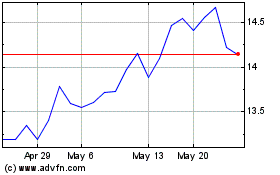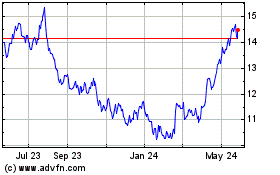Asian Shares Mixed on China Data and BOJ Decision
November 01 2016 - 12:10AM
Dow Jones News
Asian markets were mixed Tuesday after the release of
encouraging purchasing managers index data from China and as the
Bank of Japan largely held firm on its policies.
Hong Kong's Hang Seng Index was trading up 1.2% and the Shanghai
Composite was up 0.4%. Both were getting a lift from the release of
better-than-expected manufacturing PMI data coming out of
China.
The official manufacturing PMI rose to 51.2 in October from 50.4
in September, adding to signs that the world's second-largest
economy is stabilizing. A measure below 50 indicates a contraction.
China's official nonmanufacturing purchasing managers index, a
measure of activity outside factory gates, edged up to 54.0 in
October from 53.7 in September.
"It's really good…generally it's very encouraging," said
Margaret Yang, market analyst at CMC Markets. "I think that it's
going to provide support for industrial metals."
The Caixin manufacturing PMI for China was 51.2 in October, up
from 50.1 in September.
Korea's Kospi was trading slightly down at 0.03% after the
release of export data.
Japan's central bank largely held fire in a policy update on
Tuesday. The BOJ said it would keep its deposit rate steady at
-0.1%, and would continue to target a zero yield for 10-year Japan
government bonds. Its only notable move was to push back the
timeline for achieving 2% inflation by one year, to fiscal
2018.
Japan's Nikkei was largely unchanged—down just 0.2%—following
the BOJ news and the yen slipped 0.1% against the dollar.
South Korea's exports shrank in October, crimped by the global
recall of Samsung's defective Galaxy Note 7 smartphone. But the
pace of decline was slower than in the previous month. Exports
declined 3.2% in October from a year earlier, largely in line with
the median market forecast for a 3% drop. That followed a 5.9% fall
in the previous month. Imports decreased 5.4% from a year
earlier.
Analysts predict Korea's overseas shipments may gradually pick
up, but will likely remain under pressure as the repercussions of
the Samsung smartphone debacle drag into next year.
Electronics maker Panasonic was down 7.4% after the company cut
its profit forecast for the fiscal year ending in March, citing
slower earnings from residential solar panels and information
technology devices. Industrial robot maker Fanuc was down 4.6%
after it posted slower sales and profits for the half-year ended in
September, citing weak sales of factory automation system in Asia,
excluding China and Europe, and slower demand for auto production
robots in the U.S. and Europe.
The Reserve Bank of Australia is set to deliver its policy news
shortly, and Socié té Gé né rale expects an interest-rate cut from
the central bank. "In Australia, we diverge from the consensus and
look for another 25 basis point rate cut on the back of [a] weak
labor market and soft inflation figures," the bank said in a
note.
Looking ahead, the market was watching for U.S. ISM
manufacturing PMI data due out later tonight, U.S. jobs data
scheduled to be released Friday and, of course, the U.S.
presidential election next week.
Kwanwoo Jun, Kosaku Narioka and Liyan Qi contributed to this
article.
Write to Willa Plank at willa.plank@wsj.com
(END) Dow Jones Newswires
October 31, 2016 23:55 ET (03:55 GMT)
Copyright (c) 2016 Dow Jones & Company, Inc.
Hang Seng Bank (PK) (USOTC:HSNGY)
Historical Stock Chart
From Mar 2024 to Apr 2024

Hang Seng Bank (PK) (USOTC:HSNGY)
Historical Stock Chart
From Apr 2023 to Apr 2024
